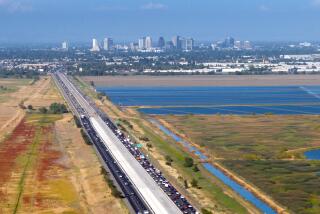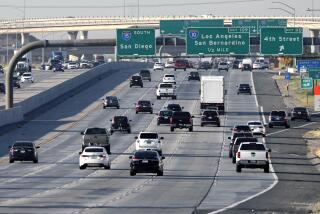Snag in O.C. Toll Road Talks
As leaders of Orange Countyâs largest tollway system consider merging the operations of their two highways, local and state politicians are asking whether the proposed merger is the best way to save the struggling San Joaquin Hills toll road.
Officials of the Transportation Corridor Agencies said for the first time Thursday that preliminary studies favor merging the San Joaquin Hills with the Foothill-Eastern tollway and refinancing their debts with a $4-billion bond issue at todayâs lower interest rates. Such a move would mean that the highways would not become free for drivers until 2044, four years later than scheduled.
Colleen Clark, the TCAâs chief financial officer, told the agencyâs board members that the San Joaquin Hills tollway cannot stand alone financially, nor can surplus revenue from the Foothill-Eastern spare the San Joaquin Hills from a potential default on its bonds.
âThe Foothill-Eastern is doing well, but it does not have a lot of extra revenue for the San Joaquin Hills,â said Clark, noting the studies. âThere is not enough money every year, and the San Joaquin Hills cannot restructure [refinance] its debt.â
For almost two years, the TCA and a passel of bond and financial consulting firms have been studying a possible merger and other options to turn around the ailing San Joaquin Hills, a 16-mile tollway that runs through western Orange County. A final report on the feasibility of a merger is due in November.
The latest traffic and revenue studies show that the San Joaquin Hills will earn less than half the money predicted when the highway was refinanced six years ago. Among the reasons: slower-than-anticipated development in south Orange County and competition from the recently widened San Diego Freeway.
If nothing is done, the San Joaquin Hills could be in technical default on at least $1.5 billion in bonds by 2005 and in partial default on interest payments to investors by 2012. Technical default means the agency would violate an agreement with bondholders to collect $1.30 in revenue for every $1 in expenditures and debt service.
The latest studies show that options short of merging the highway systems will not generate enough revenue to save the San Joaquin Hills from default.
TCA officials further warn that if the San Joaquin Hills defaults, a trustee would be appointed to run it, and tolls might have to be collected until 2061 to pay off its debts.
Over the past few weeks, however, Assemblyman Lou Correa (D-Santa Ana), and the Board of Supervisors have been urging caution as the TCA moves ahead with the merger proposal.
County supervisors have agreed unanimously to hire an independent consulting firm to analyze the corridor agencyâs finances, the proposed merger and the possibility of refinancing. Supervisors Tom Wilson, Bill Campbell and Chris Norby, who voted for the consultants, also are TCA board members.
The supervisors said they are concerned that many of the TCAâs financial and bond consultants who are studying the merger have a potential stake in any refinancing that might occur should the merger proceed.
Last Friday, Correa called on state Controller Steve Westly to review the TCAâs finances as well. Correa sent a letter reiterating his request to the TCA on Thursday during the agencyâs board meetings.
âI am concerned that not all the options are being looked at, and if the state is an institutional investor, then the taxpayers may have to pay more,â Correa said.
More to Read
Sign up for Essential California
The most important California stories and recommendations in your inbox every morning.
You may occasionally receive promotional content from the Los Angeles Times.











